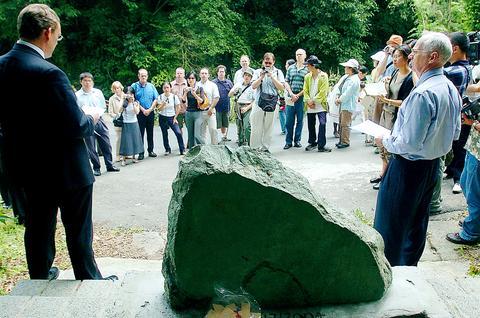Led by a bagpiper, 50 people from foreign and local communities gathered yesterday to rededicate a memorial at the site of a Japanese prisoner of war (POW) camp in Taipei County.
The memorial was erected in 1999 by the Taiwan POW Camps Memorial Society in memory of Allied prisoners interned at the Kukutsu camp in Hsintien by the Japanese during World War II. Yesterday's ceremony marked the relocation of the memorial's monument stone. It was moved because of construction in the area.
According to information provided by the society, the Kukustu camp housed around 300 POWs from May to August of 1945. Originally the prisoners were interned at the Kinkeseki camp in Chinguashi, where they were forced to work under brutal conditions in the nearby copper mine. However, Allied naval blockades prevented the Japanese from shipping the copper, causing them to shut down the mine and move the prisoners to other locations, including Kukutsu, said society director Michael Hurst.

PHOTO: SEAN CHAO, TAIPEI TIMES
Because they could see the end of the war looming, "the Japanese really didn't care if the men [in Kukutsu] lived or died. If they wanted shelter, they had to build their own huts. If they wanted to eat, they had to figure out how to get food," Hurst said.
"Although the men were only there for three months, many survivors told us that Kukutsu was the worst POW camp because of the starvation and beatings," he said.
Wang Tsai-ching (
"I was only seven years old when the POWs came. The POWs were really pitiful; they couldn't eat or walk without getting hit by the Japanese soldiers. The Japanese really looked down on the prisoners," Wang said.
"They were given almost nothing to eat. When they were given time to bathe, they would pretend to bathe in the creek nearby and beg the locals for food," he said.
The British Trade and Cultural Office representative at the ceremony, Deputy Director Rod Bunten, said that the memory of the POW camps in Taiwan held special significance in light of the recent outcry over abuse of Iraqi prisoners in US camps.
"The experience of the POWs in Taiwan should serve as a timely reminder that prisoner abuse has happened and will happen again," he said, adding that it is important to remember the past so that abuses will not happen in the future.
There were a total of 10 Japanese POW camps throughout Taiwan, holding mostly British, US and Dutch prisoners.

Trips for more than 100,000 international and domestic air travelers could be disrupted as China launches a military exercise around Taiwan today, Taiwan’s Civil Aviation Administration (CAA) said yesterday. The exercise could affect nearly 900 flights scheduled to enter the Taipei Flight Information Region (FIR) during the exercise window, it added. A notice issued by the Chinese Civil Aviation Administration showed there would be seven temporary zones around the Taiwan Strait which would be used for live-fire exercises, lasting from 8am to 6pm today. All aircraft are prohibited from entering during exercise, it says. Taipei FIR has 14 international air routes and

The Ministry of National Defense (MND) today released images of the military tracking China’s People's Liberation Army (PLA) movements during the latest round of Chinese drills around Taiwan. The PLA began "Justice Mission 2025" drills today, carrying out live-fire drills, simulated strikes on land and maritime targets, and exercises to blockade the nation's main ports. The exercises are to continue tomorrow, with the PLA announcing sea and air space restrictions for five zones around Taiwan for 10 hours starting from 8:30am. The ministry today released images showing a Chinese J-16 fighter jet tracked by a F-16V Block 20 jet and the

City buses in Taipei and New Taipei City, as well as the Taipei MRT, would on Saturday begin accepting QR code payments from five electronic payment providers, the Taipei Department of Transportation said yesterday. The new option would allow passengers to use the “transportation QR code” feature from EasyWallet, iPass Money, iCash Pay, Jkopay or PXPay Plus. Passengers should open their preferred electronic payment app, select the “transportation code” — not the regular payment code — unlock it, and scan the code at ticket readers or gates, General Planning Division Director-General Liu Kuo-chu (劉國著) said. People should move through the

Taiwan lacks effective and cost-efficient armaments to intercept rockets, making the planned “T-Dome” interception system necessary, two experts said on Tuesday. The concerns were raised after China’s military fired two waves of rockets during live-fire drills around Taiwan on Tuesday, part of two-day exercises code-named “Justice Mission 2025.” The first wave involved 17 rockets launched at 9am from Pingtan in China’s Fujian Province, according to Lieutenant General Hsieh Jih-sheng (謝日升) of the Office of the Deputy Chief of the General Staff for Intelligence at the Ministry of National Defense. Those rockets landed 70 nautical miles (129.6km) northeast of Keelung without flying over Taiwan,